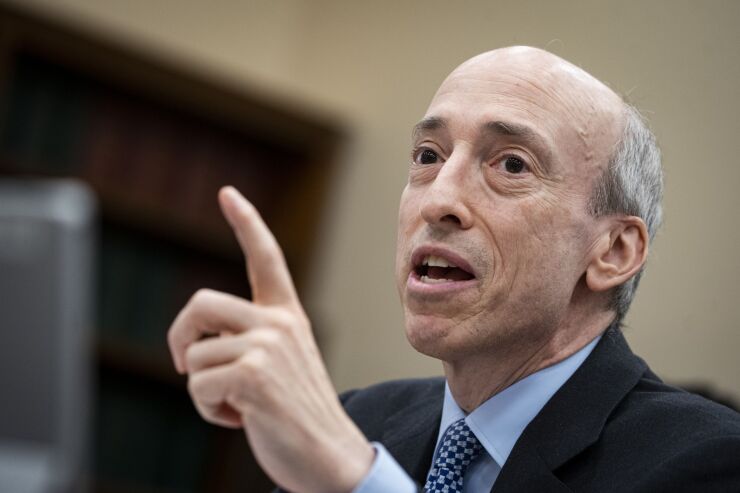The Securities and Exchange Commission's Public Finance Abuse Unit expanded its efforts in fiscal year 2022, filing 20 enforcement actions in a mix of civil and standalone administrative proceedings that included first ever charges for limited offering exemptions and its first ever charges against a broker dealer for violating a municipal advisor registration rule.
The annual statistics, published late Tuesday, showed that the Commission overall filed 9% more enforcement actions in 2022 than it did in 2021, which was already a 7% increase from 2020. These included 462 stand alone or new enforcement actions, a 6.5% increase from 2021, which ran the gamut from first-of-their-kind actions to traditional securities laws violations.
"I continue to be impressed with our Division of Enforcement," said SEC chair Gary Gensler. "Enforcement results change from year to year. What stays the same is the staff's commitment to follow the facts wherever they lead."

The SEC collected more money in civil penalties, disgorgement and prejudgment interest than it ever has on record, totaling $6.439 billion, up significantly from the $3.852 billion collected last year. Fiscal year 2022 also saw its second highest year ever in whistleblower awards, with respect to both the number of individuals and total dollar amounts awarded.
"As reflected in these results, the Enforcement Division is working with a sense of urgency to protect investors, hold wrongdoers accountable and deter future misconduct in our financial markets," said Gurbir Grewal, director of the Division of Enforcement. "A centerpiece of those efforts is ensuring that we are using every tool in our toolkit, including penalties that have a deterrent effect and are viewed as more than the cost of doing business," he added. "While we set a Commission record this past fiscal year for total money ordered at $6.4 billion, including a record $4.2 billion in penalties, we don't expect to break these records and set new ones each year because we expect behaviors to change. We expect compliance."
Twenty of the Commission's 760 cases came courtesy of the Public Finance Abuse Unit, representing 3% of total actions and 4% of civil and standalone administrative proceedings. That is a jump from the 12 total cases the Public Finance Abuse Unit dealt with in 2021, or 2% of the total.
Highlighted in the Commission's brief was its filing of litigation against Oppenheimer & Co. as well as settlements with BNY Mellon Capital Markets, TD Securities and Jefferies for failing to provide required disclosures in connection with limited offering exemptions,
"The recent actions make it clear that underwriters must adopt, maintain and enforce WSPs reasonably designed to enable them to comply with the limited offering exemption," law firm Orrick said. "WSPs should contain procedures regarding the exemption's reasonable belief requirements and should instruct personnel on how to obtain the key investor information."
The Commission also charged Chicago-based Loop Capital Markets for providing advice to a municipal entity without registering as a municipal advisor, another first for the Enforcement Division in charging a broker-dealer with violating MA rules.
The SEC also charged Asset Management Group of Bank of Hawaii, Canaan Management, Highland Capital Partners and StarVest Management for violating the SEC's pay-to-play rule for investment advisors and found that "each firm violated the rule by continuing to receive investment advisory fees from government entities following campaign contributions made by associates to elected officials or candidates for elected office," the SEC said.
But one of the most significant developments this year is the Commission's increased focus on municipal issuers, highlighted in the actions against the City of Rochester, New York and related officials, officials from the Crosby Independent School District, the former chief administrative officer and city secretary of Johnson City, Texas, as well as the town of Sterlington, Louisiana, its former mayor and its municipal advisor.
"Unlike the previous two years, when most of the SEC's enforcement activity focused largely on financial advisors and underwriters, all of these four actions directly involved municipal issuers, their employees and in most cases, their financial advisors as well," law firm Orrick said.
Based on these cases, Orrick suggests that it is good practice to require outside auditors to replace senior staff periodically, that if handed outdated financial statements, it is important to thoroughly investigate an issuer's financial condition for the period after the old financial statements and to ensure that any financial advisors on a transaction are registered with the SEC.
The Commission largely does not impose large financial burdens on municipalities due to the negative effect on taxpayers and the financial penalties, outlined in many of these cases, have largely been imposed on the individuals involved.





